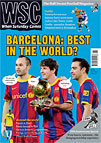 Dermot Corrigan looks at how foreigners bearing gifts are being viewed with increasing suspicion by struggling clubs in La Liga
Dermot Corrigan looks at how foreigners bearing gifts are being viewed with increasing suspicion by struggling clubs in La Liga
The fantastically wealthy foreign club owner was until recently unknown in Spain, where clubs have generally either been member-owned, dominated by local businessmen or, most commonly, a mixture of both. Then, last June, Qatar’s Sheikh Abdullah Bin Nasser Al-Thani bought Málaga, promised to sign at least five new players immediately, announced plans for a new 65,000-seat stadium and predicted Champions League glory within a few seasons.
The mood in Spain was generally positive, with the idea of a new potential challenger to Barcelona and Real Madrid welcomed by many. Sports daily Marca called the takeover a “pioneering move” and ran flattering profile pieces comparing Al-Thani’s charisma to that of José Mourinho.
The club itself played down some of the more sensational stories, and made more sensible noises about long-term plans and developing youth facilities. This was fortunate as the team took only seven points from their first nine games. Al-Thani reacted by replacing manager Jesualdo Fereira with former Real Madrid boss Manuel Pellegrini, but by Christmas Málaga were at the wrong end of the table.
Fans expecting big-name signings in the January window were underwhelmed by bargain-basement veterans like Martín Demichelis and Júlio Baptista. Pellegrini and Baptista did eventually improve results, but Málaga’s first season in foreign hands was not supposed to be a relegation battle.
The takeover of Racing Santander by Indian financier Ahsan Ali Syed in January generated even more heat and light. Syed proclaimed that “My objective is to lead Racing for many years and carry them to the great heights of European and world football”, replaced unpopular manager Miguel Ángel Portugal with fan favourite Marcelino and embraced his celebrity status – ostentatiously waving his green club scarf from the centre-circle before and after games.
Syed quickly became known throughout Spain. TV directors zoomed in on his jigs of delight whenever the team scored. Marca showcased the views of “Míster Alí” on the need for a third force in Spanish football in a soft-focus double-page feature. He even met regional president Miguel Ángel Revilla to make a very public €3 million (£2.6m) donation to a local cultural foundation.
It all looked to good to be true, and it was. Scheduled transfers from Syed’s Swiss banks did not arrive and payments to players were delayed. Meanwhile, the Australian press accused him of an AUS$100m (£66m) fraud and his bodyguard got seven months in prison for assaulting a Spanish policeman. Revilla told the local press that although he did not wish to judge his new friend’s “eccentricities”, he should “calm down a little”. Then it emerged that Syed was looking to sell the club to Bahrain’s royal family. Marca headlined the story Ali runs away from Santander.
By the time the Dubai-based Royal Emirates Group announced in April that it was buying Getafe, renaming the suburban Madrid club as “Team Dubai” and adding this new name to the club’s stadium and crest, Marca had learned its lesson. They quoted a Getafe fan saying that: “This type of deal has not brought good consequences for [other] clubs.” Columnist Almudena Rivera said such speculation was destabilising when the team needed to concentrate on avoiding relegation. Getafe’s mayor was interviewed and said he didn’t think the sale would go through.
It did though, and previous president Ángel Torres says the new owners will let him stay on as chairman for “at least three years” to oversee their investment of $130m (£79m) in the team. Changes to the badge and stadium name were possible, he admitted, while an Emirates Group spokesman, Suleiman Al-Butti, claimed: “Our vision is to now beat Real Madrid.” Torres was widely popular at Getafe, but not everyone is now happy with his reported £80m windfall.
Spanish journalists and fans are already speculating about which club will be the next to fall into overseas hands – with no shortage of candidates given the stricken finances of many La Liga clubs. It is too early yet to be sure whether all this is a good or bad thing for Spanish football. Perhaps Málaga and Getafe will be battling it out for the title this time next year. More likely, though, is that the next foreign billionaire who arrives in Spain talking of superstar signings and Champions League success will be met with a strong dose of healthy scepticism.
From WSC 292 June 2011